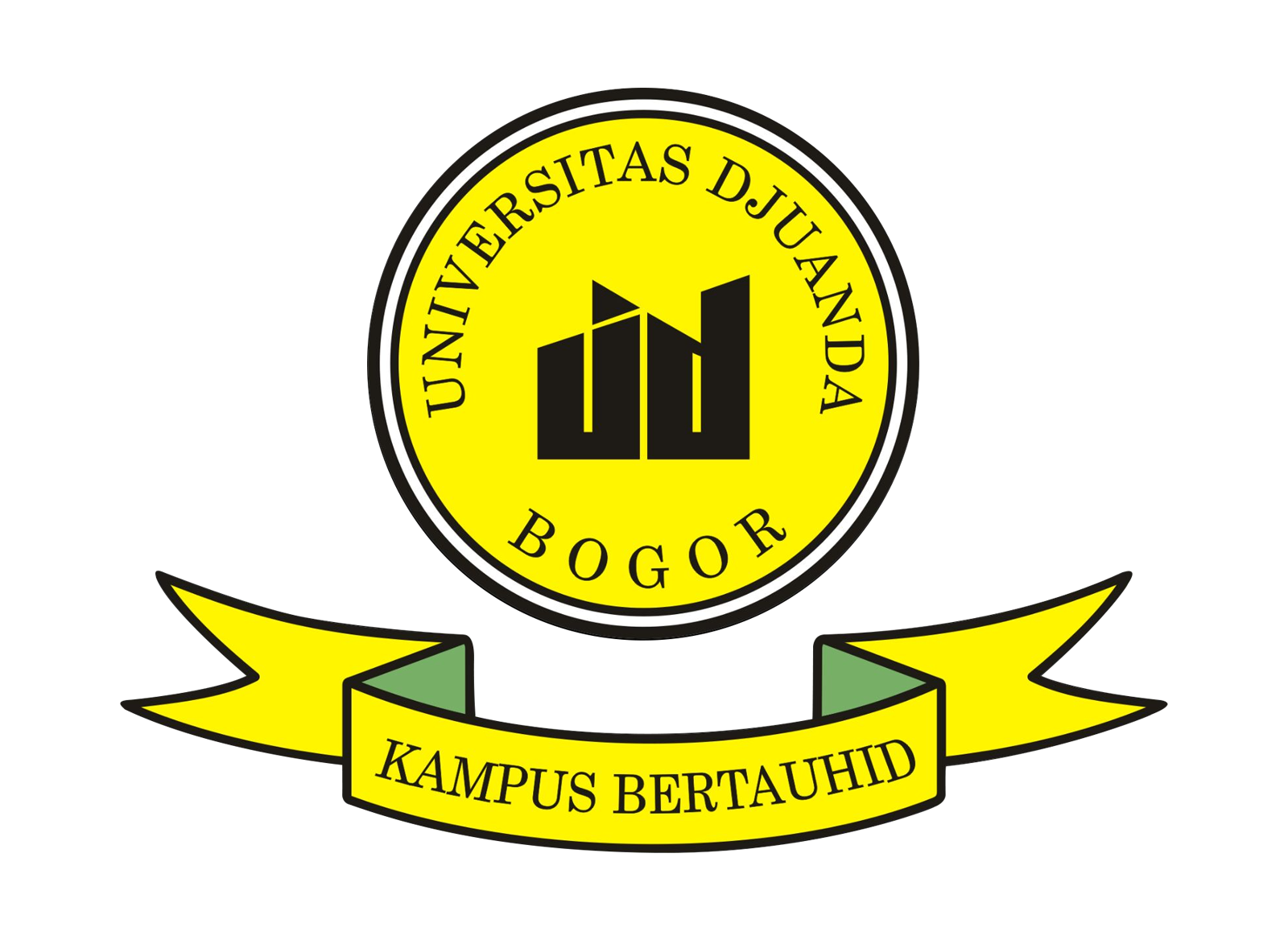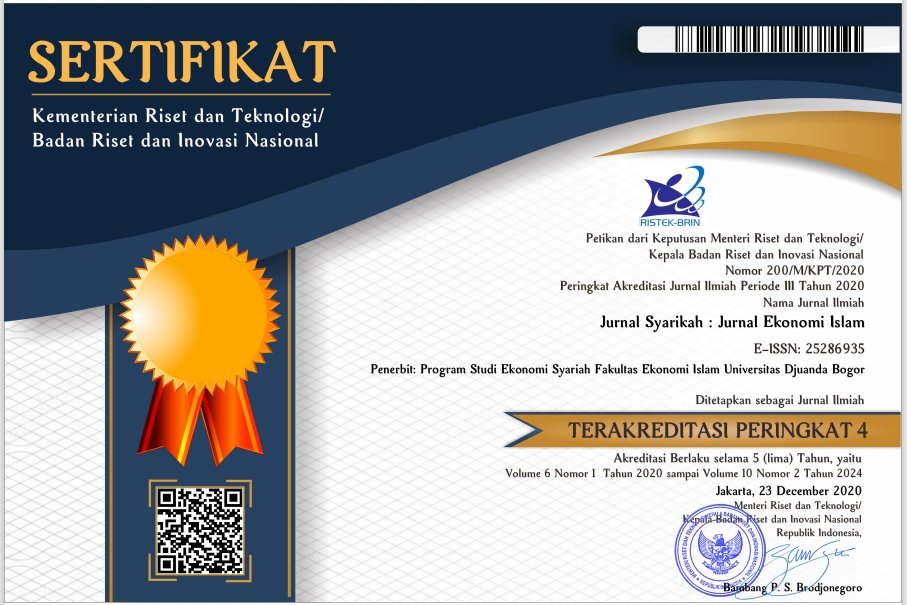DETERMINAN PERILAKU MEMBAYAR ZAKAT DI BANK SYARIAH: ANALISIS PERAN RELIGIUSITAS, TRANSPARANSI, DAN KEPUASAN NASABAH
DOI:
https://doi.org/10.30997/jsei.v9i1.8240Keywords:
Bank Syariah, Kepuasan Nasabah, Perilaku Membayar Zakat, Religiusitas, TransparansiAbstract
Permasalahan utama zakat di seluruh dunia adalah minimnya angka penghimpunan yang mengakibatkan rendahnya sokongan terhadap fakir miskin. Salah satu solusi permasalahan tersebut adalah peningkatan peran publik dalam membayar zakat di bank syariah. Studi ini bertujuan untuk memprediksi perilaku membayar zakat di bank syariah melalui peran religiusitas, transparansi, dan kepuasan nasabah. Studi ini menganalisis 200 nasabah bank syariah menggunakan SEM-PLS (Structural Equation Modelling- Partial Least Square). Berdasarkan temuan empiris, religiusitas dan transparansi berhasil memprediksi perilaku membayar zakat baik secara langsung maupun melalui peran faktor kepuasan. Secara akademik, studi ini mengimplikasikan perluasan wawasan tentang perilaku nasabah bank syariah. Secara praktis, studi ini mengimplikasikan pentingnya peningkatan edukasi keagamaan bagi nasabah, peningkatan keterbukaan informasi, dan peningkatan pelayanan yang memuaskan.
References
Abd. Wahab, N., Zainol, Z., & Abu Bakar, M. (2017). Towards developing service quality index for zakat institutions. Journal of Islamic Accounting and Business Research, 8(3), 326–333. https://doi.org/10.1108/JIABR-09-2015-0040
Abdullah, M., & Sapiei, N. S. (2018). Do religiosity, gender and educational background influence zakat compliance? The case of Malaysia. International Journal of Social Economics, 45(8), 1250–1264. https://doi.org/10.1108/IJSE-03-2017-0091
Abror, A., Patrisia, D., & Engriani, Y. (2022). Islamic bank trust : the roles of religiosity , perceived value and satisfaction. 368–384. https://doi.org/10.1108/APJML-10-2020-0715
Abror, A., Patrisia, D., Trinanda, O., & Omar, M. W. (2020). Antecedents of word of mouth in Muslim-friendly tourism marketing : the role of religiosity. https://doi.org/10.1108/JIMA-01-2020-0006
Apsari, P. I., Setiyowati, A., & Huda, F. (2022). Implementasi Sinergitas Pengelolaan Dana Zis pada Perbankan Syariah dan Organisasi Pengelola Zakat (OPZ) untuk Penguatan Ekosistem Zakat: Studi Literatur Bank Syariah Indonesia (BSI) dan Badan Amil Zakat Nasional. Issue 1 1 Perisai, 6(1), 3. https://doi.org/10.21070/perisai.v6i1.
Becker, J. M., Cheah, J. H., Gholamzade, R., Ringle, C. M., & Sarstedt, M. (2022). PLS-SEM’s most wanted guidance. International Journal of Contemporary Hospitality Management. https://doi.org/10.1108/IJCHM-04-2022-0474
Chin, W. W. (2014). The Partial Least Squares Approach to Structural Equation Modeling. April.
Cokrohadisumarto, W. bin M., Zaenudin, Z., Santoso, B., & Sumiati, S. (2020). A study of Indonesian community’s behaviour in paying zakat. Journal of Islamic Marketing, 11(4), 961–976. https://doi.org/10.1108/JIMA-10-2018-0208
Farouk, A. U., Md Idris, K., & Saad, R. A. J. Bin. (2018). Moderating role of religiosity on Zakat compliance behavior in Nigeria. International Journal of Islamic and Middle Eastern Finance and Management, 11(3), 357–373. https://doi.org/10.1108/IMEFM-05-2017-0122
Kasdi, A. (2016). Filantropi Islam Untuk Pemberdayaan Ekonomi Umat ( Model Pemberdayaan ZISWAF di BMT Se-Kabupaten Demak ). 9(2), 227–245.
Kocako, D. (2020). The effect of service quality and customer satisfaction on customer loyalty The mediation of perceived value of services ,. https://doi.org/10.1108/IJBM-03-2019-0096
Kurniawan, A., Amboningtyas, D., & Seputra, A. (2021). THE INFLUENCE OF SERVICE QUALITY, PRICE, AND BRAND IMAGE ON CONSUMER LOYALTY WITH CUSTOMER STATISFACTION AS A MEDIATING VARIABLE. 2000.
Kusumawati, A., Listyorini, S., & Yulianto, E. (2019). The impact of religiosity on fashion value and patronage intention. 23(4), 269–290. https://doi.org/10.1108/RJTA-04-2019-0014
Losada-otálora, M. (2018). Investigating the transformative impact of bank transparency on consumers ’ financial well-being. https://doi.org/10.1108/IJBM-03-2018-0079
Muflih, M. (2022). Muzakki ’ s adoption of mobile service : integrating the roles of technology acceptance model ( TAM ), perceived trust and religiosity. https://doi.org/10.1108/JIABR-09-2021-0273
Naz, S., Asrar-ul-haq, M., & Ahmed, M. (2022). Relationship between brand innovativeness and customer satisfaction : a moderated mediation model from Generation M perspective. https://doi.org/10.1108/JIMA-01-2022-0029
Owoyemi, M. Y. (2020). Zakat management: The crisis of confidence in zakat agencies and the legality of giving zakat directly to the poor. Journal of Islamic Accounting and Business Research, 11(2), 498–510. https://doi.org/10.1108/JIABR-07-2017-0097
Parker, C., Mathews, B. P., Parker, C., & Mathews, B. P. (2006). Customer satisfaction : contrasting academic and consumers ’ interpretations Customer satisfaction : contrasting academic and consumers ’ interpretations.
Puskas BAZNAS. (2021). Outlook Zakat 2019. In BAZNAS PUSKAS Working Paper Series (Issue December).
Rahman, M. S. (2017). Customer ’ s patronage decision toward health insurance products Mediation and multi-group moderation analysis. https://doi.org/10.1108/APJML-12-2016-0248
Rama, A. (2020). Strategic pricing by Islamic banks and the impact on customer satisfaction and behavioral intention. 2017–2033. https://doi.org/10.1108/JIABR-04-2019-0078
Raudhah, S., Syariah, P., & Syariah, P. (2020). PEMBAYARAN ZAKAT DI PERBANKAN SYARIAH: DITINJAU MENURUT PANDANGAN MAJELIS PERMUSYAWARATAN ULAMA ACEH. 1, 18–33.
Saad, R. A. J., & Farouk, A. U. (2019). A comprehensive review of barriers to a functional Zakat system in Nigeria: What needs to be done? International Journal of Ethics and Systems, 35(1), 24–42. https://doi.org/10.1108/IJOES-06-2018-0090
Saad, R. A. J., Farouk, A. U., & Abdul Kadir, D. (2020). Business zakat compliance behavioral intention in a developing country. Journal of Islamic Accounting and Business Research, 11(2), 511–530. https://doi.org/10.1108/JIABR-03-2018-0036
Santoso, C. B., Alim, M. N., & Riyadi, S. (2018). Critical Perspective And Reconstruction Governance Organization Management Zakat In Indonesia. Archives of Business Research, 6(5), 269–276. https://doi.org/10.14738/abr.65.4633
Sawmar, A. A., & Mohammed, M. O. (2021). Enhancing zakat compliance through good governance: a conceptual framework. ISRA International Journal of Islamic Finance, 13(1), 136–154. https://doi.org/10.1108/ijif-10-2018-0116
Schnackenberg, A. K., & Tomlinson, E. C. (2016). Organizational Transparency: A New Perspective on Managing Trust in Organization-Stakeholder Relationships. In Journal of Management (Vol. 42, Issue 7). https://doi.org/10.1177/0149206314525202
Ummulkhayr, A., O. (2017). Penentu Kepatuhan Zakat perilaku di kalangan Muslim yang hidup di bawah pemerintahan Non-Islam. Jurnal Zakat Internasional,Jil. 2, No. 1, hlm. 95–108.
Ur Rehman, A., Aslam, E., & Iqbal, A. (2021). Factors influencing the intention to give zakāt on employment income: evidence from the Kingdom of Saudi Arabia . Islamic Economic Studies, 29(1), 33–49. https://doi.org/10.1108/ies-05-2020-0017
Wahyuni-td, I. S., & Fernando, Y. (2020). The e ff ects of good governance and fraud prevention on performance of the zakat institutions in Indonesia : a Shar ī ʿ ah forensic accounting perspective. July. https://doi.org/10.1108/IMEFM-03-2019-0089
Widiastuti, T., Cahyono, E. F., Zulaikha, S., Mawardi, I., Ubaidillah, M., & Mustofa, A. (2021). Optimizing zakat governance in East Java using analytical network process ( ANP ): the role of zakat technology ( ZakaTech ). 12(3), 301–319. https://doi.org/10.1108/JIABR-09-2020-0307
WZF Research and Development in, Strategic, C. with B. C. of, & Studies. (2021). World Zakat Performance Index: A Conceptual Framework.
Zaenudin, Z., Manajemen, J., Islam, U., Agung, S., & Sumiati, B. S. (2020). Kajian tentang perilaku masyarakat Indonesia dalam membayar zakat. 4. https://doi.org/10.1108/JIMA-10-2018-0208
Zainal, H., Bakar, A. A., Al, R., & Saad, J. (2016). Reputation , Satisfaction of Zakat Distribution , and Service Quality as Determinant of Stakeholder Trust in Zakat Institutions. 6, 72–76.
Downloads
Published
How to Cite
Issue
Section
License
Copyright (c) 2023 Jurnal Syarikah : Jurnal Ekonomi Islam

This work is licensed under a Creative Commons Attribution-ShareAlike 4.0 International License.
Authors who publish with Jurnal Syarikah: Jurnal Ekonomi Islam agree to the following terms:
- Authors retain copyright and grant the journal right of first publication with the work simultaneously licensed under a Creative Commons Attribution 4.0 International License that allows others to share the work with an acknowledgement of the work's authorship and initial publication in Jurnal Syarikah: Jurnal Ekonomi Islam.
- Authors are able to enter into separate, additional contractual arrangements for the non-exclusive distribution of the journal's published version of the work (e.g., post it to an institutional repository or publish it in a book), with an acknowledgement of its initial publication in Jurnal Syarikah: Jurnal Ekonomi Islam.
- Authors are permitted and encouraged to post their work online (e.g., in institutional repositories or on their website) prior to and during the submission process, as it can lead to productive exchanges, as well as earlier and greater citation of published work
SURAT PERNYATAAN PEMINDAHAN HAK CIPTA[1]
Yang bertanda tangan di bawah ini adalah penulis naskah yang berjudul:
yang diajukan untuk dipublikasikan pada Jurnal Syarikah : Jurnal Ekonomi Islam ISSN 2442-4420 menyatakan bahwa:
Kami bersedia memindahkan hak publikasi, distribusi, reproduksi, dan menjual naskah kamiyang berjudul tersebut di atas sebagai bagian dari Jurnal Syarikah kepada Dewan Redaksi Jurnal Syarikah : Jurnal Ekonomi Islam ISSN 2442-4420
Demikian surat pernyataan ini saya buat dengan sadar, penuh rasa tanggung jawab, dan tanpa paksaan dari pihak mana pun!
No | Nama Penulis (lengkap dengan gelar akademik) | Nama dan Alamat Institusi, email | Tanda Tangan | Tanggal |
1 |
|
|
|
|
2 |
|
|
|
|
3 |
|
|
|
|
4 |
|
|
|
|
5 |
|
|
|
|
[1] Dikirim ke Dewan Redaksi Jurnal Syarikah, Program Studi Ekonomi Islam Fakultas Ekonomi Islam Universitas Djuanda Bogor, Gedung B Lantai IV Jl Tol Ciawi No. 1 Kotak Pos 35 Ciawi Bogor 16720, difaksimilikan ke 02518240985, dan hasil scanning-nya diemailkan ke Jurnal.Syarikah@unida.ac.id


